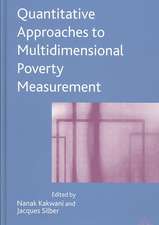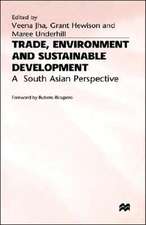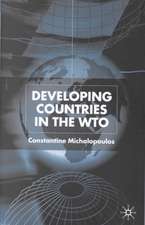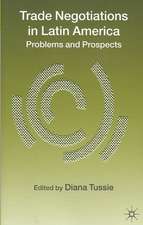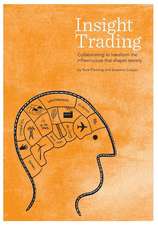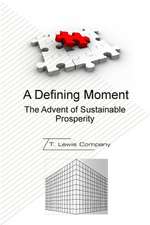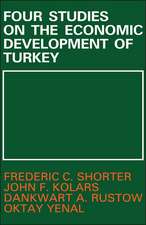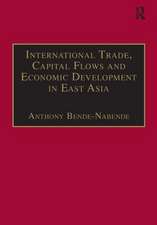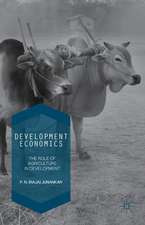First World, Third World
Autor W. Ryrieen Limba Engleză Paperback – mar 1999
| Toate formatele și edițiile | Preț | Express |
|---|---|---|
| Paperback (1) | 636.80 lei 6-8 săpt. | |
| Palgrave Macmillan UK – mar 1999 | 636.80 lei 6-8 săpt. | |
| Hardback (1) | 643.16 lei 6-8 săpt. | |
| Palgrave Macmillan UK – 24 feb 1999 | 643.16 lei 6-8 săpt. |
Preț: 636.80 lei
Preț vechi: 749.19 lei
-15% Nou
Puncte Express: 955
Preț estimativ în valută:
121.85€ • 127.56$ • 100.82£
121.85€ • 127.56$ • 100.82£
Carte tipărită la comandă
Livrare economică 05-19 aprilie
Preluare comenzi: 021 569.72.76
Specificații
ISBN-13: 9780333759769
ISBN-10: 0333759761
Pagini: 272
Ilustrații: XVII, 253 p. 5 illus.
Dimensiuni: 140 x 216 x 18 mm
Greutate: 0.32 kg
Ediția:2nd ed. 1999
Editura: Palgrave Macmillan UK
Colecția Palgrave Macmillan
Locul publicării:London, United Kingdom
ISBN-10: 0333759761
Pagini: 272
Ilustrații: XVII, 253 p. 5 illus.
Dimensiuni: 140 x 216 x 18 mm
Greutate: 0.32 kg
Ediția:2nd ed. 1999
Editura: Palgrave Macmillan UK
Colecția Palgrave Macmillan
Locul publicării:London, United Kingdom
Cuprins
List of Tables and Figures Foreword to the Second Edition Acknowledgements Introduction Half a Century of International Development Success or Failure The Illusion of State-Managed Development The Market Revolution Global Capital Flows Is Capitalism Right for the Third World? Re-Inventing Aid The International Finance Corporation What Future for the World Bank and IMF? The Collapse of the Second World Where Now? Twenty Propositions about Development and Aid Notes and References Index
Recenzii
'Ryrie makes no effort to justify or excuse the disappointing results of billions of dollars to aid the Third World since the end of the WW II. To the contrary, he provides the perfect blend of inside perspective and academic objectivity...Ryrie accomplishes a great deal in this book. Not only does he analyse the past; he also takes the lessons from his analysis and transfers them to clear inscriptions for the future...This is one of the best books this reviewer has ever read in the entire literature of international economic development.' - A. Barrett, Choice
'Bill Ryrie has exposed very clearly the dilemmas now facing aid and development organisations. He makes an overwhelming case for supporting the market economies of developing countries - just as he did, in practical ways, during his immensely successful period as Head of the International Finance Corporation. Drawing on his unrivalled experience and track record, he has written a book which is realistic, wise and compassionate, and which should be read by all those involved in the development field.' - Eddie George, Governor, Bank of England
'The Principles and policies of official development assistance need to be completely rethought. Aid should be redirected away from governments - which have wasted too much money - and towards the private sector. Aid can be harmful if it supports bad anti-market policies involving state ownership and control. Africa in particular may have been given too muchaid, which has simply been frittered away. Apart from relief supplied to avert famine or clean up after natural disasters, aid should not be a subsidy but should have the character of investment. The objective of all aid must be self-reliance, not dependence. These challenging assertions which are likely to provoke intense argument in Washington and capitals around the world come from Sir William Ryrie.' - Kevin Rafferty, Emerging Markets IMF/World Bank Daily
'This admirably clear and trenchant book argues that the aid movement has lost its way...This wise and important book...deserves careful attention from all those interested in the aid business.' - Martin Wolf, Financial Times
'No-one else could so effectively combine blunt, hard-headed assessment of the accomplishments and failures of development assistance with a practical passion that the effort continue in new ways. In First World, Third World Bill Ryrie sums up a lifetime of hands-on experience in economic development with insights that demand attention if we are to avoid the mistakes of the past.' - Bruce MacLaury, President, The Brookings Institution, Washington, DC
'Ryrie...believes international aid is in crisis. His aim in this book is to show a way ahead for aid that will dispel what he calls 'a massive cynicism and disillusionment about what can be expected of it.' - Central Banking
'Bill Ryrie has exposed very clearly the dilemmas now facing aid and development organisations. He makes an overwhelming case for supporting the market economies of developing countries - just as he did, in practical ways, during his immensely successful period as Head of the International Finance Corporation. Drawing on his unrivalled experience and track record, he has written a book which is realistic, wise and compassionate, and which should be read by all those involved in the development field.' - Eddie George, Governor, Bank of England
'The Principles and policies of official development assistance need to be completely rethought. Aid should be redirected away from governments - which have wasted too much money - and towards the private sector. Aid can be harmful if it supports bad anti-market policies involving state ownership and control. Africa in particular may have been given too muchaid, which has simply been frittered away. Apart from relief supplied to avert famine or clean up after natural disasters, aid should not be a subsidy but should have the character of investment. The objective of all aid must be self-reliance, not dependence. These challenging assertions which are likely to provoke intense argument in Washington and capitals around the world come from Sir William Ryrie.' - Kevin Rafferty, Emerging Markets IMF/World Bank Daily
'This admirably clear and trenchant book argues that the aid movement has lost its way...This wise and important book...deserves careful attention from all those interested in the aid business.' - Martin Wolf, Financial Times
'No-one else could so effectively combine blunt, hard-headed assessment of the accomplishments and failures of development assistance with a practical passion that the effort continue in new ways. In First World, Third World Bill Ryrie sums up a lifetime of hands-on experience in economic development with insights that demand attention if we are to avoid the mistakes of the past.' - Bruce MacLaury, President, The Brookings Institution, Washington, DC
'Ryrie...believes international aid is in crisis. His aim in this book is to show a way ahead for aid that will dispel what he calls 'a massive cynicism and disillusionment about what can be expected of it.' - Central Banking
Notă biografică
SIR WILLIAM RYRIE'S varied career, including much first-hand experience of the Third World, qualifies him particularly well to write about aid and development. The first fifteen years of his life were spent in India. He worked in the Colonial Office and then for twenty years at the British Treasury, including four years on the Boards of the World Bank and the IMF. For two years he managed the British aid programme, as Permanent Secretary of the Overseas Development Administration. Then from 1984 to 1993 he was Head of the International Finance Corporation, a part of the World Bank Group which exists to promote economic development through the fold, establishing it as an important factor on the world development scene. Ryrie is now a part-time investment banker mainly active in emerging markets around the world. He is Deputy Chairman of the Commonwealth Development Corporation.

